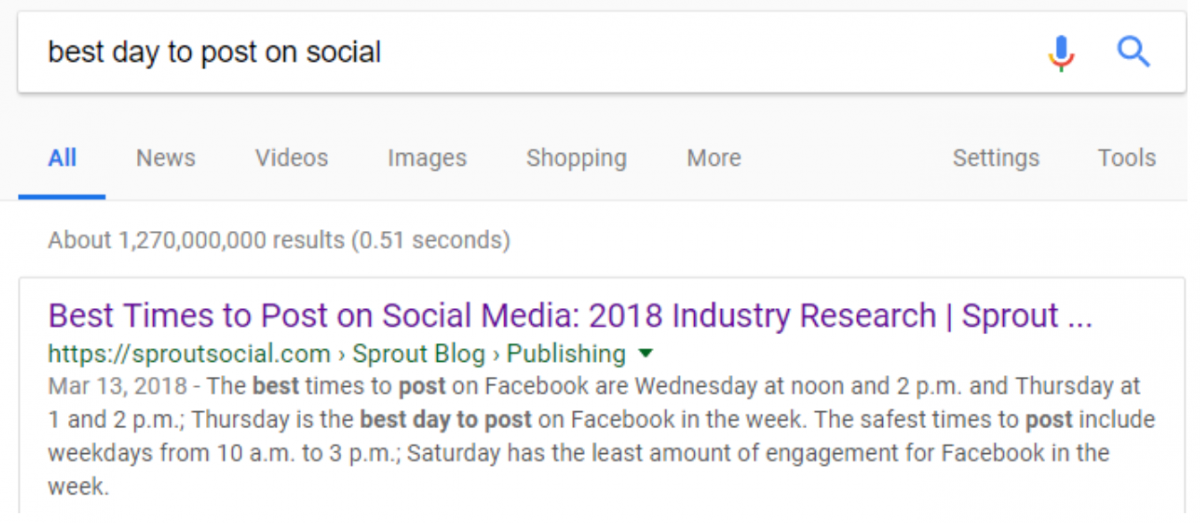One of the Top Digital Marketing Agencies in Boston Explains.
The answer to almost any question you could ever imagine is at your fingertips – literally. Google and other popular search engines like Yahoo and Bing have made it possible to find answers to even the strangest questions in an instant.
If you’re looking for answers to questions like, “What does a Capybara look like?” or, “What is the best day of the week to post on social media?” – You probably won’t type all of those words into the Google search bar. Who  has time for that? Instead, you would probably type in the most relevant keywords, like “capybara image” or “best day to post on social.”
has time for that? Instead, you would probably type in the most relevant keywords, like “capybara image” or “best day to post on social.”
Less than one second later, you’re looking at page after page of links to websites that claim to have your answer. It’s like magic! Sorry to burst your bubble, but it’s actually just the result of highly complex algorithms used by Google bots crawling web pages for keywords and content that best matches your query – or, SEO.
That’s NOT What I Was Looking For…
The problem is that sometimes when you type in minimal keywords, the results you get aren’t exactly what you were looking for. A simple query for “Capybara,” without the additional word “image,” will likely present you with a host of websites with more information you could ever want or need to know about the exotic animal. All you really wanted was a picture, not an encyclopedia’s worth of information. TMI, Google!
Or, maybe you were looking for a chart that shows the best days of the week to post on each social media platform. Typing in “best day to post on social” may not be specific enough. Let’s see what we get when we search right now:

Not bad. This article talks about the best days and times to post on Facebook. What about Twitter? LinkedIn? Overall, it’s not too much work when you think about how they did it back in the day, but still not exactly what you wanted.
In Comes Voice Search to Save the Day!
With Google’s voice search app, you don’t have to type anything at all. You can simply ask your question, and Google will find the most relevant answer. It’s easy to turn on and use voice search. In Google Chrome, on the right-hand side of your search bar (above settings), just click on the microphone icon to enable voice search:

As long as your microphone and speakers are turned on, you’ll receive your answer – out loud. You may have to do some additional research if you want more to receive in-depth information, but simple responses are almost instantaneous.
Now, let’s use voice search and see what we get:

This time, Google gave us search results that include Facebook, Twitter, and LinkedIn. Now, you could argue that the second query was more detailed than the first, and typing that same query in the search bar vs. using voice search would yield the same result. And, you would probably be right. However, the fact is that most people don’t type in full sentence format when they are searching for something.
Most of the time, people shorten their query into a few words that they feel best describes what they’re looking for, leaving Google to do most of the work. And why not? Isn’t that what they do? Sure, but wouldn’t it be easier for everyone if we just said exactly what we wanted? It would. And, it is.
Most Popular Voice Search Apps and Devices
OK Google: Google Voice Assistant
Google Voice Assistant is a feature of Google Search offering predictive cards with information and daily updates in the Google app for Android and iOS. Google Now proactively delivers information to users to predict information they may need, set reminders and much more.
Siri: Siri Voice Assitant by Apple
Siri is an intelligent personal assistant, part of Apple Inc.'s iOS, watchOS, macOS, and tvOS operating systems. It can find restaurants near you, set reminders, answer requests and questions.
Google Home: Google Voice Assistant
Google Home is a brand of smart speakers developed by Google. ... Google Home speakers enable users to speak voice commands to interact with services through Google's intelligent personal assistant called Google Assistant. You can literally connect Google Home to your home. Turn your lights on or off, get your favorite show playing from Netflix to your TV, even set your thermostat when you're not at home, all instantly with your voice. No more trouble figuring out which remote to use to turn on your TV and other devices!
Amazon Echo: Also known as Alexa Voice Assistant
Amazon Echo (shortened and referred to as Echo) is a brand of smart speakers developed by Amazon.com. The devices connect to the voice-controlled intelligent personal assistant service Alexa, who responds to the name "Alexa." This "wake word" can be changed by the user to "Amazon", "Echo" or "Computer".
Voice Search Has Transformed the Way We Search
Instead of merely typing in a bunch of words in hopes that Google will understand what we’re looking for, voice search allows us to essentially have a conversation with Google (or whatever search engine/voice assistant you may be using). According to ComScore, it is estimated that voice search will account for 50% of all search queries by the year 2020.
This isn’t a new theory – it was predicted back in 2016, when Google Trends estimated that voice-related searches and commands had increased 35x since 2008, as a result of the iPhone launch and the introduction of Google voice search. So why are we talking about it right now? Because, it’s changing the way that Search Engine Optimization (SEO) works.
 Featured Snippets
Featured Snippets
Google’s SEO algorithms are anything but easy to keep up with, and at times, it may seem it’s nearly impossible to get found online. Even the top digital agencies in Boston will agree to that. However, recent SEO developments indicate that Google favors featured snippets – “a special block above the organic search results that Google sometimes shows for certain queries, usually questions (i.e., who/what/where/when/why/how).”
Therefore, content that specifically asks and answers these questions tends to make its way to the top search positions. Getting your content to show up as a featured snippet is like an SEO trump card. If you can create high-quality content that answers specific questions that people are looking for answers to, you can potentially increase your search rank.
Key Points
Of course, this isn’t top secret information, so you still have to have the right answer, the best answer, and the best quality of content to succeed. If you want your website to show up higher in search engines, you’ve got to play the SEO game. If you’re looking for assistance with digital marketing services for your business, SMILE media can help. Contact us today to learn more about our digital marketing services.










